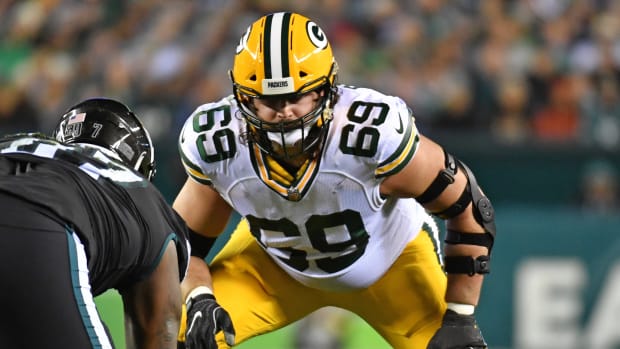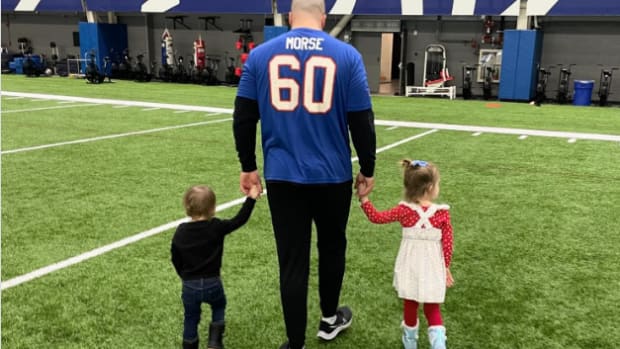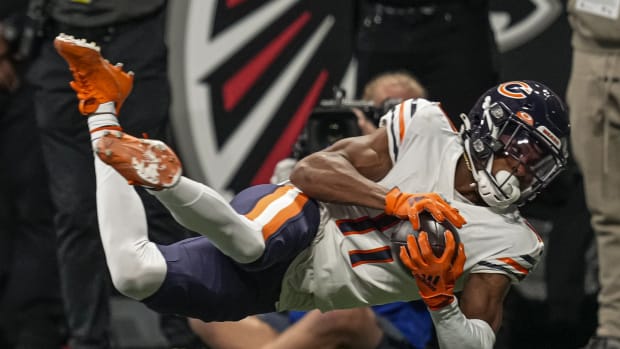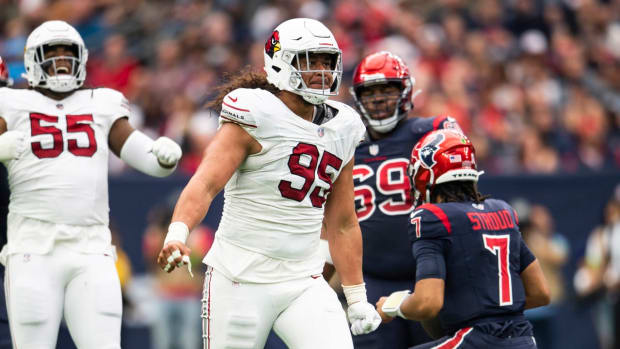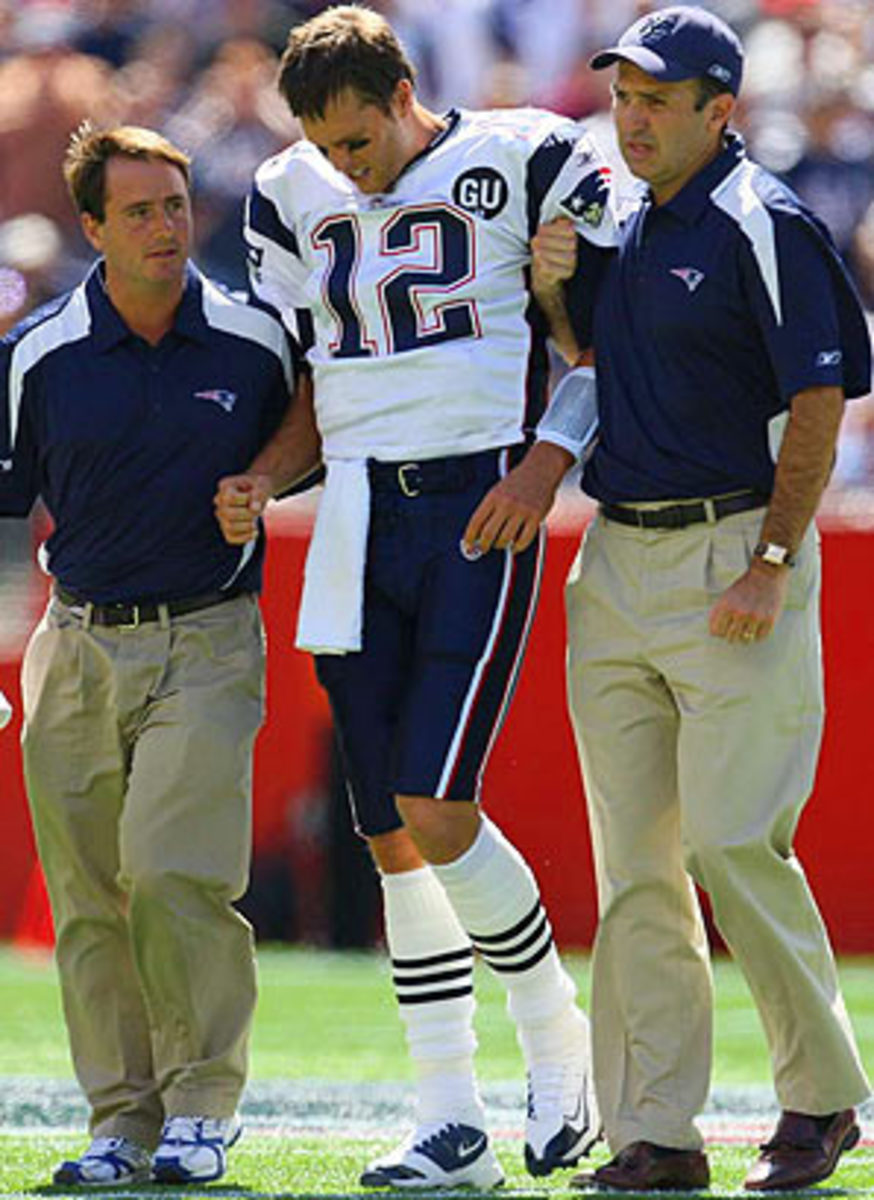
Cold Hard Football Facts: A hypothetical look at Brady's lost '08
Tom Brady returned to practice this week for the first time since a catastrophic knee injury ended his 2008 campaign just 7 minutes, 22 seconds into the season.
The injury was more than physically devastating for the 2007 NFL Most Valuable Player. Coming fresh off his record-setting 50-TD and 16-0 season of 2007, Brady lost a chance to continue his rocket-like ascent up the all-time leaderboards in so many passing categories. It cost Brady:
• A shot at a second consecutive league MVP award• A shot at possibly capturing several of the greatest passing records in history• A shot at a fifth conference title, fourth Super Bowl title and third Super Bowl MVP award in just nine NFL seasons, feats which would have been unprecedented in such a short timeframe.
It's hard to envision an injury that had a more potentially catastrophic impact on football history this side of Gale Sayers. And while Brady may continue on to even greater things ahead, he will never recover the Great Lost Season of 2008.
The Cold, Hard Football Facts generally deal only with the harsh, inalterable reality of raw numbers.
But for the sake of this offseason exercise, and here in the depths of the interminable NFL offseason, let's make a very rational assumption. Let's assume Brady, already fourth on the career passer rating list, would have turned out a very, very good season in 2008 had he played, but that he would have fallen short of all of the marks he put up in his signature 2007 season.
Let's assume, then, that Brady's 2008 production looked like this:
• 342 of 535 (63.9%), 4,100 yards, 7.7 YPA, 38 TDs, 12 INTs, 101.6 passer rating
Even though it's well off the pace of 2007, this projected 2008 season would have been a statistical behemoth of a performance. Brady in 2008 would have finished:
• Fourth in the NFL in passing yards• Second in passer rating• First in touchdown passes
That performance would have been good enough, in all likelihood, to propel Brady to his second consecutive league MVP award. Instead, the honor last year went to Brady's foil, Peyton Manning. But here's how the league MVP performed in 2008:
• 371 of 555 (66.8%), 4,002 yards, 7.2 YPA, 27 TD, 12 INT, 95.0 passer rating
Given our hypothetical performance, Brady would have bested the 2008 league MVP in yards, yards per attempt, TDs and passer rating. It's reasonable to assume these advantages would have been enough for the defending MVP to earn the honor again in 2008.
The statistical performance, and the award, would have had long-term implications for the legacies of both players, not to mention long-term implications for all those cyber-debates on chat boards around the country. After all, in this scenario, both Manning and Brady would boast a pair of MVP trophies and both would claim to have won the TD-toss title three times in their respective careers.
Instead, Manning boasts a 3-to-1 advantage in MVP awards and a 3-to-2 advantage in TD titles.
Brady rocketed up the career leaderboards in every single passing category during his epic 2007 campaign.
In 2008, though, he attempted just 11 passes. Had he not been injured, had he produced at the rate the Cold, Hard Football Facts have projected, he would stand today, on the cusp of the 2009 season, with the following career stat line:
• 2,636 of 4,177 (63.1%), 30,470 yards, 7.3 YPA, 235 TDs, 98 INT, 94.05 passer rating
These numbers would have been good enough to move Brady high up into the leaderboards of a variety of key statistical areas. They also would have set up Brady to break through a slew of other barriers here in 2009.
Passing yardsWith a projected 30,470 passing yards through 2008, Brady would have leaped into the top 30 all time after just nine NFL seasons, one spot ahead of Randall Cunningham (29,979 yards in 16 NFL season) and one spot behind Norm Snead (30,797 in 16 NFL seasons).
More impressively, Brady would have been poised to climb into the top 20 in career passing yards here in 2009. The No. 20 spot is currently held by Phil Simms (33,462 in 14 seasons) and would have been easily within reach of Brady this year.
Instead, Brady enters the 2009 season well down the career passing-yardage leaderboard at No. 51 (26,446).
TouchdownsWith a projected 235 TD passes through 2008, Brady would have jumped into the top 20 all time after just nine NFL seasons, one spot ahead of Steve Young (232 in 15 NFL seasons) and one spot behind George Blanda (236 in 26 NFL seasons).
More impressively, Brady would have been poised to climb into the top 10 in career TD passes here in 2009. The No. 10 spot is currently held by Dave Krieg (261 in 19 NFL seasons), a mark that would have been easily within reach, while Joe Montana stands at No. 9 (273 in 15 seasons).
Instead, Brady enters the 2009 season well down the TD-pass leaderboard at No. 28 (197).
Passer ratingWith a projected 94.0 career passer rating through 2008, Brady last year would have climbed over statistical juggernaut Kurt Warner (93.8) into No. 3 on the all time list, behind only Steve Young (96.8) and Manning (94.7).
In either case, Brady could still challenge Manning and Young for the No. 1 or No. 2 spot on the all time list. But losing a season at the very height of his career certainly hurts Brady's statistical cause, not only in passer rating, but also in so many other key areas.
Brady claimed this week that he feels good enough to play another 10 seasons. It makes for a good sound bite, but it's highly unlikely. He turns 32 in August and few quarterbacks in history have played into their 40s. None have performed at a high level in their 40s.
But let's assume Brady has another six seasons as a starter left in him. And let's assume that, over those six seasons, his average performance is the same as his average performance from 2001 to '07:
• 328 of 520 (63.1%), 3,766 yards, 7.2 YPA, 28 TD, 12 INT, 93.2 passer rating
Here's what Brady's final career numbers would look like given this projection:
• 4,269 of 6,773 (63.0%), 49,042 yards, 7.2 YPA, 365 TD, 158 INT, 93.0 passer rating
And here's what Brady's career numbers would look like as projected, but adding in the "lost season" of 2008:
• 4,611 of 7,308 (63.1%), 53,142 yards, 7.3 YPA, 403 TD, 170 INT, 93.7 passer rating
In either case, Brady will find himself among the top four or five all time in every key statistical indicator, including completions, yards, TDs and passer rating. But he'd have to play an extra season-and-a-half or two seasons late in his career to recoup the numbers of the lost season at the height of his career.
Brady, with a bit of health and luck, certainly would have been on pace to challenge the all-time records of Brett Favre, Dan Marino and those likely to set by Manning. But the "lost season" makes breaking these records nearly statistically impossible.
For the average football-obsessed troll such as yourself, the statistical impact of Brady's lost season is a nice intellectual study.
But the greatest impact of the 2008 injury is the impact it had on New England's title hopes -- which in turn could have had a dramatic impact on Brady's legacy, as rings so often do for every great quarterback.
The 2008 Patriots went 11-5 and fielded the league's No. 8 scoring offense (25.6 PPG), and they did it all with an unknown quarterback who hadn't started a game since high school.
It's quite reasonable to assume the 2008 Patriots would have been, for the sake of argument, two games better in 2008 with Brady at the helm and would have scored more effectively.
With an additional four points per game on offense, meanwhile, the 2008 Patriots would have led the league in scoring for the second consecutive season, outpacing the Saints (28.9 PPG) for the No. 1 spot.
With two more victories, the Patriots would have gone 13-3, would have captured the AFC East crown for the sixth consecutive season and would have captured the No. 1 or No. 2 seed in the AFC.
Specifically, with Brady at the helm and an average of four more points per game, the 2008 Patriots, in all likelihood, would have bested the Colts (an 18-15 loss) and the Jets (a 34-31 OT loss).
The 13-3 Patriots behind Brady and the league's No. 1 offense would have been a very, very popular choice to reach the Super Bowl once again. They would have hosted at least one, and maybe two playoff games at Gillette Stadium, an arena in which Brady has never lost in the postseason (8-0).
And if they did reach the Super Bowl, the Patriots would have faced the 9-7 Cardinals -- a team they destroyed 47-7 in late December.
In this instance, Brady, not Ben Roethlisberger, might have torched the pathetic Cardinals pass defense in the Super Bowl, and Brady, not Santonio Holmes, might have won Super Bowl MVP honors.
In the process, and in this very, very plausible scenario, Brady would have joined John Elway as the only quarterback to lead his team to five Super Bowls. He would have joined Montana and Terry Bradshaw as the only quarterbacks to win four Super Bowls. He would have joined Montana as the only three-time Super Bowl MVP.
----
Brady may get other opportunities to match these marks. In fact, the Patriots are the Vegas offseason favorites to win Super Bowl XLIV.
But he'll never recapture the chance he had to win the Super Bowl last year and he'll never recapture this one critical season at the very height of his skills.
Instead, Brady's catastrophic injury of 2008, coupled with New England's devastating loss in Super Bowl XLII, leaves us with a mounting list of might-have-beens for one of the all-time greats.

































